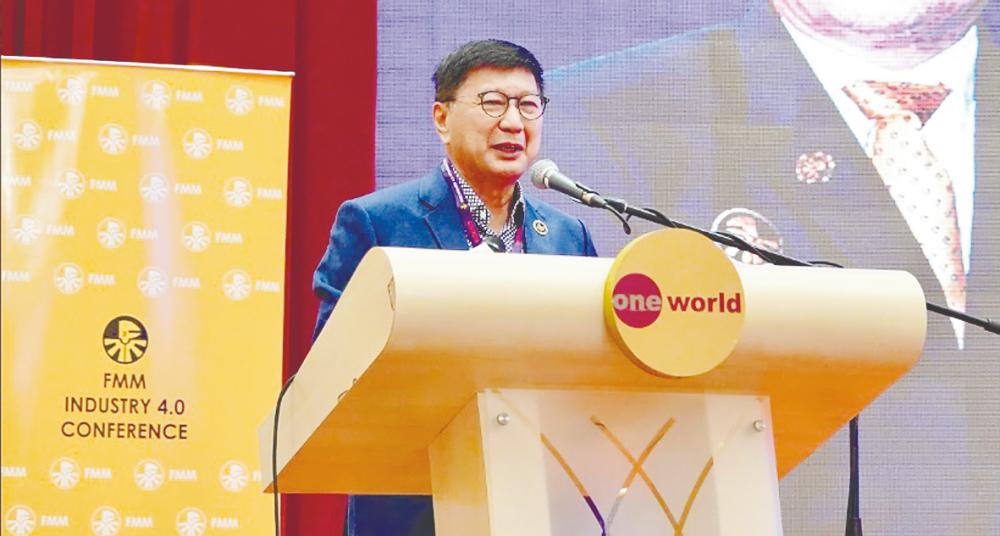KUALA LUMPUR: The Federation of Malaysian Manufacturers (FMM) today urged the government to provide double tax deduction to support domestic industries’ adoption of Industry 4.0 (IR4) and upscale their innovation in organising, managing, and controlling the value chain life cycle.
FMM president Tan Sri Soh Thian Lai said the government, together with related agencies and stakeholders, should set up an environmental, social, and governance (ESG) fund of RM2 billion, which FMM has been discussing for the past few years.
“This is particularly relevant for SMEs (small and medium-sized enterprises). In Malaysia, SMEs comprise 97.5% of our businesses, which is nearly 1.3 million companies. Of these, 97.5% are micro SMEs, whereby around 900,000 to 1 million companies, 87% are considered micro SMEs.
Apart from the ESG fund, we also need to have a national automation and IR4 fund to further support micro and SMEs on the path towards full digital transformation across the entire product lifecycle,” he told reporters at the FMM Industry 4.0 Conference 2024 here today.
FMM proposed that the government provide double tax deduction for domestic companies that adopt IR4 and digitalisation technology in artificial intelligence (AI), big data, autonomous robots and manufacturing robotic systems, industrial Internet of Things, cloud computing, cybersecurity, system integration, factory automation system and smart warehouse management system.
The double tax reduction should cover tax relief that can be used to offset taxable income for approved IR4 and digitalisation projects by the government.
Further, FMM proposed that the government introduce new tax incentives for the establishment of manufacturing artificial intelligence (AI) and robotics systems on the production floor.
It also suggested that the government provide an accelerated capital allowance for AI and robotics systems up to a qualifying expenditure of RM5 million for SMEs that implement manufacturing AI and robotics systems starting Jan 1, 2025.
To support local SMEs and accelerate industry adoption of IR4 and the digitalisation process, FMM proposed that banks offer technology adoption financing with a lower interest rate of 2% on a loan for a minimum tenure of five years payback.
Touching on 5G, Soh said domestic industries are unwilling to invest in 5G for their factories, citing high cost as the main reason.
“If the government could offer double tax deduction for this type of investment, it would significantly encourage them. Secondly, when the Ministry of Investment, Trade and Industry issues manufacturing licences to multinational companies or domestic investors, they should require new factories to be equipped with 5G. To encourage this and attract more foreign and local companies, the government could offer double tax deduction.
“This way, all new factories would be 5G-compliant. Currently, upgrading thousands of existing factories to 5G is costly, and the government lacks the funds to cover this in industrial zones,“ Soh said.
Touching on financial assistance, he said that while SMEs need government assistance to advance modern technologies in their operations, domestic banks also play a crucial role in steering companies in Malaysia to adopt IR4 technologies.
“Currently, many banks are interested in providing loans to all factories, including SMEs. However, the interest rates can be high. Some banks offer lower rates, but these rates are still relatively high. If the government could provide corporate guarantees through agencies like Credit Guarantee Corporation Malaysia Bhd, banks could then offer interest rates of 2-3%.
“Currently, bank loan interest rates range from 5-7%. Lower rates, supported by government guarantees, would encourage more SMEs in IR4 adoption,“ Soh said.
On skilled talents needed in the IR4 ecosystem, he said the government should set up a national apprenticeship fund to help SMEs automate and reduce reliance on foreign workers.
“We have about 2.5 or 2.6 million foreign workers in Malaysia. These are legal workers. We do not know the number of illegal workers working here.
“If Malaysia aims to become a high-income and highly productive nation, automation and IR4.0 technologies, such as artificial intelligence, are crucial. These advancements will help industries modernise their processes and attract better talent,” Soh said.









